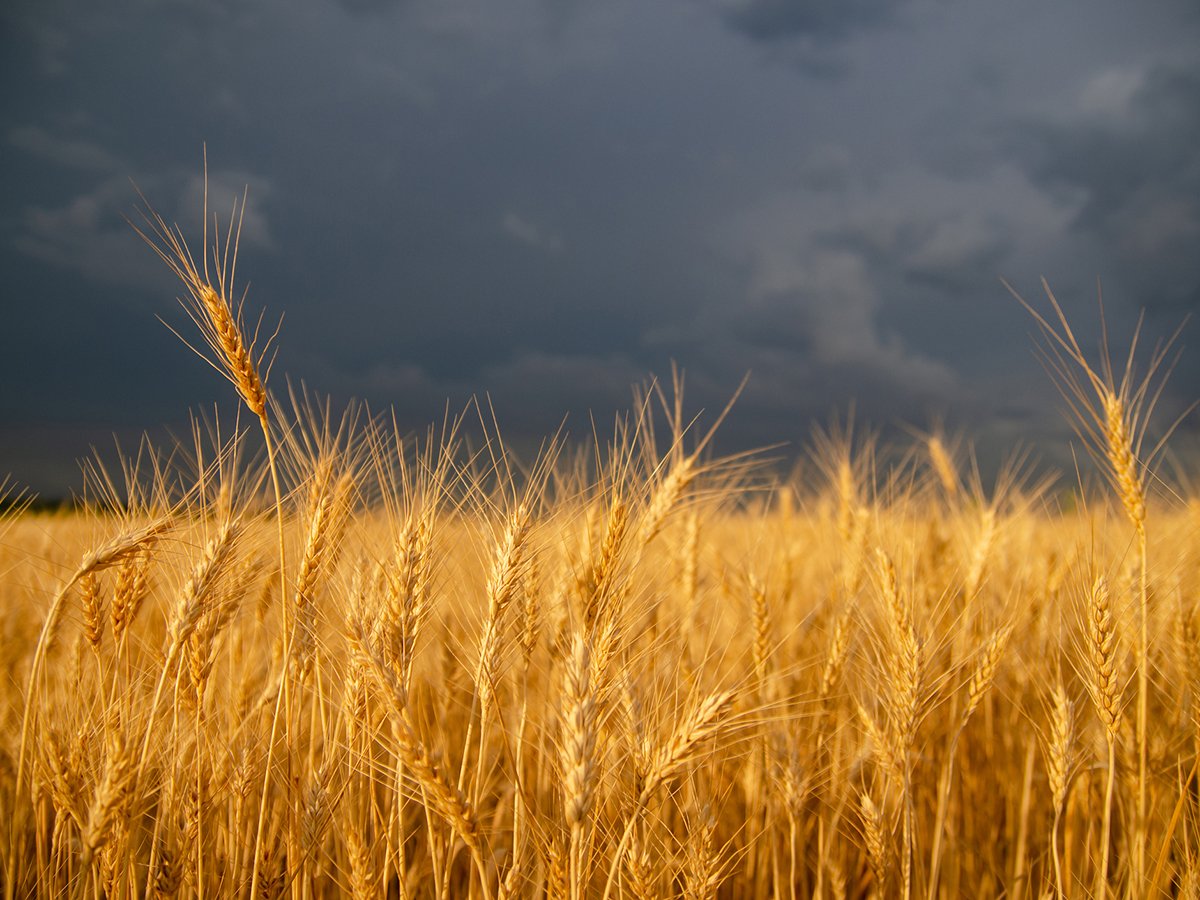I am writing to caution producers about having anything less than vigorous support for the Canadian Wheat Board in the upcoming barley vote.
The recent byelection upset in North Battleford illustrates what can happen when the majority becomes complacent or over-confident.
Polls indicated the government would return with a comfortable majority, but instead the confident didn’t bother to vote and the opposition gained a seat in a 52-percent turnout.
Regardless of who you think should have won that race, the same situation must not occur in the barley vote.
Read Also

Late season rainfall creates concern about Prairie crop quality
Praying for rain is being replaced with the hope that rain can stop for harvest. Rainfall in July and early August has been much greater than normal.
We know the majority of producers favor retaining barley under the CWB and we must do all we can to ensure every ballot is cast.
I urge you to return your vote immediately after receiving your ballot. Make a special trip if you have to.
Don’t wait until you have to go to the bank or the store anyway; mail that ballot as soon as it gets in your hand.
We don’t just need a win, we need to win big!
– Glenn Tait,
Meota, Sask.
Odd letters
To the Editor:
…When I started to see farmers writing in support of the CWB, I was mystified. Letter after letter, written obviously by older farmers, who would state that “before we had the CWB, we would have to take whatever they would give us, whether it was enough or not.”
This was the general theme of these farmers.
Now I do not want to sound like I have no respect for our senior citizens. I respect the many hours of hard work they did to make a living. I realize that what now takes us hours to do, would take them weeks, and I admire their ambition and devotion.
But as far as farming in the ’90s, they have obviously missed the boat. It seems we again face the problem of having to take whatever they give us, whether it is enough or not.
Today, the CWB tells us what we will get for our wheat, they tell us when we can haul it, and if we don’t like it, that’s too bad. If you have never felt like a sucker, then you have never dealt with the CWB.
The mass support for the CWB can only be compared to an ostrich with its head in the sand. People obviously resist change, and if you do not change with the times, they will steam-roll you. …
Today though computers, advanced communications, transportation and other developments, a single-desk selling agency is not necessary to our survival.
If your idea of a farmer selling his grain is waiting for quota or contract to open, then we have lost the ambition and devotion that the generation before us showed. The CWB way is the lazy way. The farmers that want to find new ways to market grain will survive.
The others will fade away.
With the upcoming barley vote, Western Canadian farmers have the opportunity to show that we are ready to move into the 21st Century.
Those who want to maintain the status quo, do not realize the backward step they will be taking. You should think back to 1994-95, when we received the $1.94-a-tonne payment on feed barley. It seemed we would receive a decent final payment, but the CWB blamed the farmers. Little wonder there is contempt for the CWB. Actions like those have led to this vote.
The CWB claims that because the farmers do not sell to them, that they can’t move enough bushels to get a good enough price. …
The modern farmer knows a good risk from a bad risk, and the CWB is a bad risk.
When you vote, remember that the CWB always has somebody to blame. The Americans, the Europeans, the railway, the ships, and the farmers.
The CWB never takes the blame. They are always ready to pass the buck, but we never seem to get the cash!
– Rick Coleman,
Alexander, Man.
Two issues
To the Editor:
Currently there are two issues relating to the Canadian Wheat Board. One is the barley marketing issue, the other is the amendments to the Wheat Board Act. Farmers should not confuse one issue with the other.
Soon farmers will vote on whether (1) they would like a completely open market for all barley or (2) they would prefer to keep the current system where they have a choice of selling to the CWB for export and malt barley or to the domestic open market for feed barley.
It is easy to get caught up in the hype of the debate and make a decision without applying a lot of common sense in the process.
One should support change only if it will be of benefit in the long term. If present circumstances change, will a new system still perform well?
Care needs to be taken so that the advantages and strengths of the current system are not lost.
The U.S. market has been lucrative because of the subsidy programs and because of the shortages caused by production problems. As U.S. production returns to normal and as subsides are reduced, will those lucrative prices still be there?
Will Canadian farmers be able to preserve the reputation for quality that Canadian grain has earned in the international market place?
Proponents of dual marketing have not put forward a workable proposal. To make a dual system work, “leakage” from one system to the other would have to be prevented requiring so many rules and regulations that no one would be happy. Even now, CWB performance is hampered because the Board cannot rely on a steady supply of barley from year to year.
Some farmers feel that they should have the right to sell to whomever they please without regulation or restriction. Some people from outside farming have taken up this cry.
Remember that virtually every business operates within rules and regulations for that industry.
No one can run a radio station or get into the trucking business without following rules and regulations and obtaining a license or permit.
If farmers feel they are constrained by the current system, they will feel even more constrained if barley is removed from the Board entirely. Then there will be no choice, only the open market.
By working together, farmers can extract more money from the marketplace.
It is true that an individual might be able to get more than his neighbor for a specific product on the open market, but according to market advisers from Alberta Agriculture, two-thirds of the grain is sold in the bottom one-third of the market.
The high prices are there only when a very limited amount of product is available.
Please mark your ballot and return it.
A large response will send a strong message regarding what kind of a system producers want.
A small response will not settle anything.
– Maurice Kostichuk,
Insinger, Sask.
Alberta policy
To the Editor:
In recent weeks, Mr. Ralph Goodale, Minister of Agriculture and Agri-Food Canada, has expressed his “personal opinion” and written “Dear Editor” letters belittling the “notion” of “dual marketing” or what Alberta producers and I have called “market choice.” …
The CWB, Minister Goodale states, “would definitely be affected.” It “would be diminished in at least five ways.” From my point of view, the long-term interests of Alberta farmers and their ability to maximize the money in their pockets are the more important issues than the future of this institution. …
I feel compelled to respond, given the position taken by the majority of Alberta farmers and the Government of Alberta on market choice and Bill C-72.
Can the Minister explain why his response to the need for marketing changes, obtained through “thorough consultations” with farmers, is so radically opposed to those of the Grain Panel he personally chose? Can he explain why they are contrary to the views expressed through several polls conducted by his government, other governments and by industry?
The poll his ministry conducted, following the recommendations of the Western Grain Marketing Panel, showed the majority of farmers favored marketing choice for feed barley, spot pricing of wheat, sale of unregistered varieties of wheat, marketing organic-wheat, and letting the CWB market other crops. The November 1995 Saskatchewan Government poll showed voluntary participation in the CWB was supported by 58 percent of participants. A November 1995 plebiscite in Alberta showed 66 percent of those voting want options for barley marketing and 62 percent for wheat.
Surely the concerns expressed with Bill C-72, an Act to Amend the Canadian Wheat Board Act, including the concerns expressed by his advisory committee to the CWB, should lead to more modest claims than that of “thorough consultations” with farmers.
Turning to the five ways the Minister thinks the Board would be diminished, Alberta farmers who voted for marketing choice (call it dual market or open market) are not naive enough to believe the CWB operations would be unaffected. Changes in the regulation (monopoly buyer status) would have definite effects on the operations of the CWB, indeed changes that the majority of farmers in Alberta want to see implemented.
Yes, under market choice and open markets, the pool could be smaller, and the CWB’s global reach and marketing clout reduced by the extent that farmers choose alternative marketing systems and production practices to maximize their returns.
But how different would these effects be than any of those that the Board normally responds to? Does the Board not affect the size of the pool, the Board’s global reach, its marketing clout, year-to-year reliability and so on under the current monopoly situation? Do not the quantities produced under different grades vary year to year as well?
The Statistical Handbook 1996 of the Canadian Grain Commission shows wheat exports have varied between a low of 10 million tonnes in 1987-88 to a high of 22 million tonnes in 1991-92. Exports of barley have varied between a high of 6.5 million tonnes in 1986-87 to a low of 2.6 million tonnes in 1988-89.
There is no reason to believe that the Board could not offer prices, services, and efficiencies to attract grain in an open market system away from other competitors.
If all the Minister’s claims of superior performance, price premiums, etc. prevail, why would the CWB be diminished in an open market? …
Uncertainties about volume and quality are red herrings to say the least. What would prevent the Board or any other entity (farmers, farmers’ co-operative, grain company) from contracting to buy specific quantities and quality of grain over a specified period of time with fair premiums/penalties?
It is the establishment and application of standards set by the Canadian Grain Commission which protects Canada’s reputation for quality and consistency, not the CWB.
It’s the farmers’ grain, it should be the farmers’ choice.
– Walter Paszkowski,
Minister of Agriculture,
Edmonton, Alta.
Dual fantasy
To the Editor:
The continuous sinister prattle by the corporate grain trade commodity groups obstructing the orderly system to market grain is not good common sense or in the best interest for the average crops producer. It’s unfortunate the Alberta government in their obsession is meddling to oppose the CWB orderly system. However, their Alberta vocal Minister of Agriculture should by now realize that the CWB is not a buyer of our grain but is there to sell the produce by orderly process to obtain the best average price for the crop year for all farmers collectively.
So in that light, the Board must have some control over the supply management to help the farmers to work together for best results. There is no point in that fantasy so-called dual marketing. The case is to keep the board strong or on the other hand, without working together by orderly marketing then become divided individual serfs at the mercy of corporate manipulation.
The Alberta Barley Commission, which are not represented by voluntary membership sign up, is much against the CWB orderly system and their funds deducted automatically for barley at delivery points should not be allowed. …
– C. A. Evaskevich,
Hythe, Alta.
















